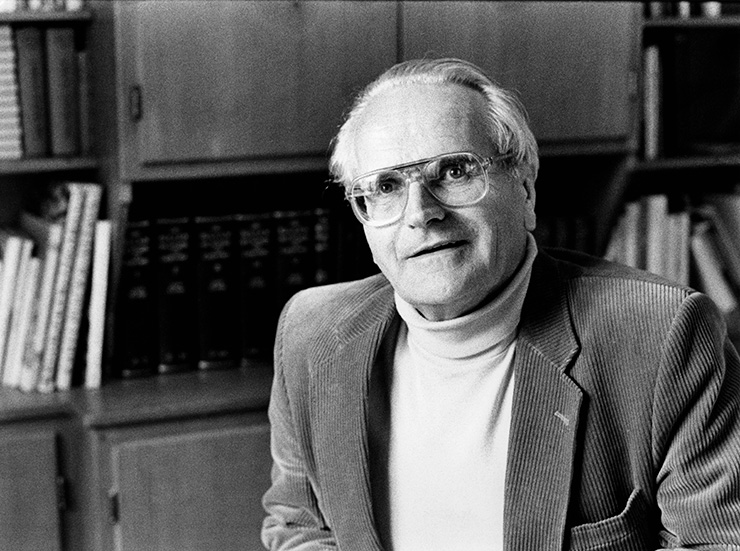
Hans Schaffert (1918–2003)
Reformed pastor who loved both friend and foe

“The present day needs people of today, not of yesterday or the day before, who are ready to go to the ends of the earth.”
Hans Schaffert was born the son of a teacher in Bussnang, Switzerland and his wife Helene. In 1942, he followed his theology professor’s suggestion that he go to study in the free zone of France, more precisely to Clermont-Ferrand, as the theological faculty of Strasbourg had been relocated there. The 23-year-old student was happy to escape Switzerland and join the Alsatian Protestant milieu with its clear stance against the Nazi regime. In Auvergne, he met members of the Inter-Movement Committee in Aid of Evacuees (Comité inter-mouvements auprès des évacués, CIMADE).
CIMADE asked him to help a colleague from the Protestant congregation in the Gurs Internment Camp in the Pyrenees. Over 3000 Jews from southern Germany had been deported to the camp at the time. Men, women, children, and old people were crammed together in unhygienic, often windowless barracks, in the freezing cold in winter and a bestial stench in summer. Schaffert made visits, helped the families and preached “the gospel of freedom in a country of slavery and injustice” each Sunday. His “parishioners” were both Jews and Christians. He often issued false baptismal certificates against all the regulations. He remained there for three months and bore witness to the first deportations to the Auschwitz concentration camp. He helped six young men to flee to Spain in a spur-of-the-moment operation. After his return to Switzerland, Schaffert wrote a report on the camp and addressed it to the President of the Federation of Swiss Protestant Churches (FSPC), Alphons Koechlin (1885–1965), who passed the report on to Federal Councilor Eduard von Steiger, the “Refugee Pastor” Paul Vogt, and Karl Barth. The politician Arthur Frey also received the report and published it anonymously. This led to a protest being submitted by the President of the Protestant Federation of France, Marc Boegner, to Marshal Philippe Pétain.
Following his ordination, Schaffert, together with the German pastor Kurt Lehmann (1892–1963), worked for Paul Vogt from 1943 to 1945 in the refugee parish office in Zurich, which was set up for Protestant refugees by the FSPC, the Reformed Church of the Canton of Zurich and the Swiss Church Aid Committee. In 1944 they received reports from Budapest on the deportation of Jews to Auschwitz from George Mandel-Mantello and, together with Rabbi Zwi Taubes, campaigned in July 1944 for the publication of these documents. In a nighttime operation from July 3–4, 1944, together with Paul Vogt, he made 2000 copies of the protocols and sent them out. The publication of the so-called Auschwitz Report by the escaped concentration camp prisoners Rudolf Vrba and Alfréd Wetzler led to a worldwide reaction and increased public pressure on the great powers. In 1989 George Mantello thanked Schaffert for his work “as one of the main participants in the rescue of 150,000 Jews in Budapest during the Holocaust”.
In 1947, Schaffert married a Jewish woman, Cécile, part of whose family were killed in the Nazi camps. From 1945 to 1953 Hans Schaffert served as a pastor in Lille, France. The community entrusted him with the pastoral care of over 200 prisoners of war classified as criminals, among them some 40 women. He reluctantly accepted the assignment to preach the Gospel to the tormentors of the Gurs victims so close to him. “I put my cards on the table,” he recalled, “I told them that I had been to the Gurs camp. I told them that I had cheated them wherever I could, that I had harmed them as often as possible. And then I told them that I wanted to be their pastor now.” Half of the prisoners initially rejected him with anti-Semitic motives, while others were more cooperative, especially as Schaffert brought them cigarettes and food upon each of his visits. And even the many prisoners who were sentenced to life imprisonment or to death were ultimately grateful for his assistance. In 1954, Schaffert concluded that some prisoners had now paid enough for their crimes. Some of them had indeed been drafted into Special Forces at a very young age. It was time to grant them a new life. So Schaffert made a remarkable decision. He wrote to French President René Coty asking him to release nine war prisoners in honor of his own nine years in the service of France. President Coty agreed and asked him to propose nine names, and they were then in fact released. According to Schaffert, they never found out about the circumstances.
From 1954 to 1961 he served as a pastor in Leysin before, in 1962, he began to set up an aid organization in Belgian Congo on behalf of the World Council of Churches and to coordinate ecumenical aid there. In 1967, the Yad Vashem Holocaust Foundation honored Schaffert as Righteous Among the Nations. From 1968 until his retirement in 1984 he was Secretary General of the Swiss Protestant Churches Aid Agency (HEKS/EPER) in Zurich. During this time he helped to significantly expand relations with the churches of Eastern Europe.



